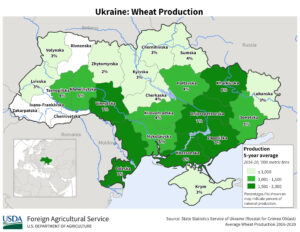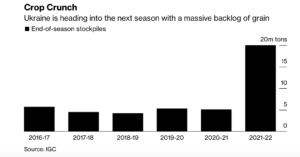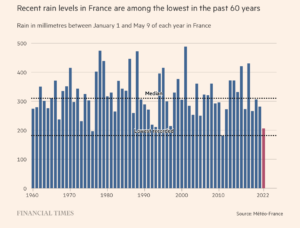President Donald Trump on Friday signed an executive order temporarily expanding the amount of beef the U.S. can import from Argentina, a move the White House says is aimed at…
Russia Makes Some Land Gains– Persists in Strangling Ukrainian Grain Exports
New York Times writers Michael Schwirtz, Marc Santora and Michael Levenson reported on the front page of today’s paper that, “Russia’s nearly three-month-old invasion of neighboring Ukraine has been punctuated by flawed planning, poor intelligence, barbarity and wanton destruction. But obscured in the daily fighting is the geographic reality that Russia has made gains on the ground.
“The Russian Defense Ministry said Tuesday that its forces in eastern Ukraine had advanced to the border between Donetsk and Luhansk, the two Russian-speaking provinces where Moscow-backed separatists have been fighting Ukraine’s army for eight years.
“The ministry’s assertion, if confirmed, strengthens the prospect that Russia could soon gain complete control over the region, known as the Donbas, compared with just a third of it before the Feb. 24 invasion.”

Today’s article noted that, “And the Russians enjoy the added advantage of naval dominance in the Black Sea, the only maritime route for Ukrainian trade, which they have paralyzed with an embargo that could eventually starve Ukraine economically and is already contributing to a global grain shortage.”
The Times writers indicated that, “[European Council president, Charles Michel], who met with Prime Minister Denys Shmyhal of Ukraine, criticized Russia for strangling Ukrainian grain exports that feed people around the world.
“‘I saw silos full of grain, wheat and corn ready for export,‘ Mr. Michel said in a statement. ‘This badly needed food is stranded because of the Russian war and blockade of Black Sea ports, causing dramatic consequences for vulnerable countries.'”

Meanwhile, Bloomberg writer Jorge Valero reported yesterday that, “The European Union is finalizing a plan to facilitate land exports of Ukraine’s stocks of food products with the Russian invasion blocking access to the country’s vital Black Sea ports.
“The European Commission will consider a strategy on Wednesday that would address technical and bureaucratic initiatives to speed up the shipping of vegetable oils, corn and wheat, some of Ukraine’s key exports, people familiar with the discussions said.”
“The EU and Ukraine are working against the clock to find a solution by summer, as the country needs to release at least 25 million tons stuck in the country in time for the beginning of the next harvest season,” the Bloomberg article said.

Associated Press writers Elena Becatoros and Jon Garmbrell reported today that, “Russia pummeled the vital port of Odesa, Ukrainian officials said Tuesday, in an apparent effort to disrupt supply lines and Western weapons shipments as Ukraine’s foreign minister appeared to suggest the country could expand its war aims.”
“Odesa is also a major gateway for grain shipments, and its blockade by Russia already threatens global food supplies. Beyond that, the city is a cultural jewel, dear to Ukrainians and Russians alike, and targeting it carries symbolic significance,” the AP article said.
However, Reuters writers Mayank Bhardwaj and Rajendra Jadhav reported yesterday that, “India exported a record 1.4 million tonnes of wheat in April, four trade sources said, providing some relief to grain markets as buyers scramble for alternatives to Black Sea supplies hit hard by the war in Ukraine.”
In other global wheat developments, Reuters writers Hallie Gu and Dominique Patton reported yesterday that, “China’s provincial authorities have been asked to investigate suspected illegal destruction of wheat fields for construction projects, and cases of the current crop being diverted into silage, the agriculture ministry said on Tuesday.”
And Bloomberg writers Alfred Cang and Jasmine Ng reported yesterday that, “Videos showing acres of wheat in China being destroyed or cut down before they mature are going viral on social media, throwing doubts on the quality of the crop in some areas at a time when global prices are soaring.”
With respect to U.S. wheat prospects, Bloomberg’s Kim Chipman reported earlier this week that, “Little rain, high winds and soaring fertilizer costs mean some Kansas farmers will have ‘very little‘ wheat to harvest in a few weeks, according to a key industry group.
“‘Much of southwest Kansas has gone nearly 300 days without an inch of precipitation,’ Kansas Wheat, which represents growers in the state, said in a statement on Monday. ‘Farmers have already been in touch with their crop adjusters.'”
In addition, Financial Times writer Akila Quinio reported yesterday that, “France’s rich wheat fields seemed an obvious partial solution to the grain shortages caused by Russia’s invasion of Ukraine, the traditional ‘bread basket’ of Europe.
But the EU’s biggest wheat exporter is facing challenges of its own. Low rainfall this year has brought the threat of drought, triggering warnings of a hit to output and exports and raising fears of a further squeeze to global supplies.
The FT article noted that, “‘France is a very big producer and exporter of wheat, and almost all of it is winter wheat,’ said Christian Huyghe, scientific director for agriculture at France’s national institute of agronomic research. ‘[The plants] use a lot of water and they are at their maximum growth period.’

“Crucially, forecasters are expecting dry, hot weather at the time when ears of wheat and barley are formed and rain is needed. ‘The next 10 days will be pretty critical,’ said Huyghe.”





